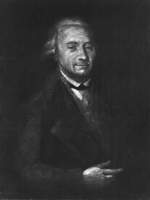Melchiorre Cesarotti
Melchiorre Cesarotti (born May 15, 1730 in Padua , † November 3, 1808 in Selvazzano Dentro ) was an Italian poet, translator and scholar.
Life
Cesarotti received the chair of rhetoric at the seminary in Padua at a very young age , but in 1762 followed a call as a teacher in the patrician house of Grimani in Venice , where he wrote his tragedies and two treatises: Sopra l'origine ed i progressi dell 'arte poetica and Sopra, il diletto della tragedia , printed. Here he met the recently published Ossian of James Macpherson know, went straight to the learning of English and released after six months, a sensational excellent Italian translation of the poem in rhymeless verses that has contributed to the revival of Italian poetry. Particularly admired the harmony of the verse structure. In 1768 Cesarotti received the professorship of the Greek and Hebrew languages in Padua and in 1779 became permanent secretary at the Academy of Sciences and Arts. In this position he wrote, among other things, his translation of the Iliad with detailed critical discussions, which, however, was considered a failed work because of the quite extraordinary and mostly unjustified freedoms which he allowed himself, whereas the literary apparatus with which he provided it was almost unprecedented Completeness was very much appreciated.
His extensive Corso ragionato della letteratura greca , begun around the same time, remained unfinished. At the instigation of his academy he wrote his excellent Saggio sulla filosofia delle lingue applicato alla lingua italiana and, as a newly appointed member of the Accademia dell'Arcadia in Rome, the no less valued Ragionamento sulla filosofia del gusto . On behalf of the Republican government, he wrote his Saggio sugli studii , the Instruzione d'un cittadino á suoi fratelli meno istruiti and the Patriotismo illuminato .
Napoleon Bonaparte made him a knight and later commander of the Order of the Iron Crown and awarded him a year's salary, for which Cesarotti was grateful for his poem Pronea (1807). In addition to the works mentioned, he created a translation of Demosthenes , which was also accompanied by extensive commentary , a number of different small treatises, a number of poems and a rich collection of letters. The great fame that Cesarotti enjoyed during his lifetime has not been preserved, but at least he is one of the most deserving men of his nation for science. A complete edition of his works that he himself had started was completed by Giuseppe Barbieri after his death . A selection of these was published in Milan in 1820, 4 volumes, and Bologna in 1882 in one volume.
literature
- Constantin von Wurzbach : Cesarotti, Melchior . In: Biographisches Lexikon des Kaiserthums Oesterreich . 2nd part. Publishing house of the typographic-literary-artistic establishment (L. C. Zamarski, C. Dittmarsch & Comp.), Vienna 1857, pp. 327-330 ( digitized version ).
Individual evidence
- ↑ (Padua 1763, 2 volumes; complete 1772, 4 volumes; Nice 1780, 3 volumes; Milan 1826–27, 4 volumes)
- ↑ Padua 1786–94, 10 volumes; Padua 1798–1802, 10 volumes
- ↑ Padua 1785, 8 volumes; Pisa 1800
- ↑ Pisa 1800–1813, 42 volumes
| personal data | |
|---|---|
| SURNAME | Cesarotti, Melchiorre |
| BRIEF DESCRIPTION | Italian poet, translator and scholar |
| DATE OF BIRTH | May 15, 1730 |
| PLACE OF BIRTH | Padua |
| DATE OF DEATH | November 3, 1808 |
| Place of death | Selvazzano |
